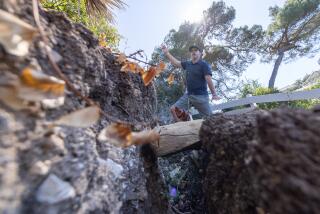What’s in a Name? Property Values, Prestige and Pride
- Share via
A tremor of bad vibes has been emanating from south of Roscoe Boulevard, which separates Reseda and Northridge. Last week, Caltech seismologists stuck a pin in Reseda, proclaiming it the newly revised epicenter of the Northridge quake. They also announced that the name “Northridge” stays.
Reseda, which has a lot of single-family homes and small businesses, is often upstaged by Northridge, which has all that plus a university, a shopping mall, an industrial base and a patina of TV stars.
Now the community can’t even get credit for being the epicenter.
Some might question why--in an already depressed real estate market--Reseda would want to claim the natural disaster that is expected to be the costliest in this country’s history.
Reseda Chamber of Commerce Executive Director Ann Kinzle bristles at the idea that Reseda would even care about such a distinction. “The whole Valley has suffered,” she said. “It doesn’t make any difference to me.”
What really gets her goat, though, are news accounts describing Reseda as less affluent than Northridge.
“We’ve got homes here that cost $385,000!” she said. “This is a bedroom community. They’ve got an industrial base that we don’t have over here.”
Now, these distinctions may be lost on Angelenos unacquainted with the Valley. After all, the two communities are contiguous; hard to tell where one leaves off and the other begins.
To the trained eye, however, Northridge ain’t Reseda and never will be.
Reseda, for one thing, has a much nicer park.
*
I grew up in Northridge, but some of my best friends lived in Reseda. As I child, I naturally knew nothing of real estate, nothing of finance, nothing of the perceptions that attach to certain geographical designations.
I did know a few things, though: I knew that Porter Ranch--a Northridge subdivision at the foothills north of Devonshire--was definitely out of our league, and that my schoolmates who lived there got much bigger allowances than I did. Compared to their big new houses, our little home on Canby Avenue--which cost $15,500 in 1960--was kind of crummy. I can forgive my parents now--after all, my father was earning only a starting professor’s salary at San Fernando Valley State College and had four kids to feed. But I recall feeling acute embarrassment when Porter Ranch moms dropped me off.
And I knew that my mother’s fondness for visiting model homes in new developments sprang from a wish to better our lot. We were always driving to some new and empty neighborhood with flags planted in the front yards instead of trees.
“Let’s take a drive up near Devonshire Downs,” she would say on a summer evening when it stayed light very late. This expression is a longstanding family joke, something we still bring up in a tone that implies we are putting on airs, something that still makes us laugh.
I was in junior high when I learned a life lesson about geography--not where the Maginot Line was or Monticello--but the difference between Northridge and Reseda.
My mother told me that some people, people who lived south of Roscoe Boulevard, insisted on using Northridge as their addresses. “Why?” I asked. “Why would they do that?”
“Because,” she replied, “they think it’s better to live in Northridge.”
Maybe you have to be from the Valley to understand it, but this is why when Northridge is news, Reseda can get resentful.
As a schoolgirl, I was never taught much about my community. I never knew Northridge as anything other than a bland suburb, fully sprung from the mind of some developer.
Maybe if I had stayed, I would have come to know and appreciate something of the place’s past, but as it happened, I couldn’t wait to get out of there after high school, couldn’t wait to find some place real , with a street life and sense of place.
The timeless rap on Southern California is that people come here to reinvent themselves, and that history--personal or political--is not important. One of our not-so-enduring myths, as well, is that we are classless.
As I look at the San Fernando Valley today, though, I see that it’s not just people reinventing themselves. It’s people reinventing their surroundings, too--erasing history with the stroke of a petition signature, all with an eye on the bottom line, all with an eye toward the next rung on the social ladder. No wonder it’s hard to get a sense of place.
What used to be the college is now the university.
What used to be Sepulveda is now North Hills.
What used to be a part of Canoga Park is now West Hills. (No real hills in either place, far as I can tell.)
And now Porter Ranch is putting on airs, seeking its own community designation, no longer content to be merely Northridge.
The sensibility is simple. In the words of one Valley councilman’s aide: “Give me a different name and my property values go up.”
Hard hit as we’ve been by riots, recession and earthquakes, maybe a citywide name change is in order.
How does Toronto strike you?
More to Read
Sign up for Essential California
The most important California stories and recommendations in your inbox every morning.
You may occasionally receive promotional content from the Los Angeles Times.










